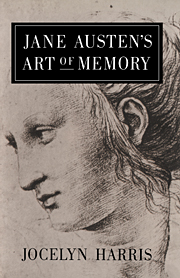Book contents
- Frontmatter
- Contents
- Preface
- 1 Northanger Abbey
- 2 The return to Richardson
- 3 Sense and Sensibility
- 4 Pride and Prejudice
- 5 Mansfield Park
- 6 Emma
- 7 Persuasion
- Conclusion: ‘Nothing can come of nothing’
- Appendix 1 The History of Sir Charles Grandison
- Appendix 2 Sir Charles Grandison in the juvenilia
- Notes
- Bibliography
- Index
- Frontmatter
- Contents
- Preface
- 1 Northanger Abbey
- 2 The return to Richardson
- 3 Sense and Sensibility
- 4 Pride and Prejudice
- 5 Mansfield Park
- 6 Emma
- 7 Persuasion
- Conclusion: ‘Nothing can come of nothing’
- Appendix 1 The History of Sir Charles Grandison
- Appendix 2 Sir Charles Grandison in the juvenilia
- Notes
- Bibliography
- Index
Summary
In Emma and Persuasion Jane Austen reaches back to Shakespeare and to Chaucer. She calls on Richardson now only to solve particular problems, for where almost every page of Sense and Sensibility, Pride and Prejudice, and Mansfield Park bear traces of him, he does not much matter in the last two novels. She who had already drawn on Locke, Milton, Richardson, and others, now places herself even more firmly in the main line of English literature, proving the truth of Dryden's contention that poets too have a heritage, ‘our Lineal Descents and Clans, as well as other Families’ [Poems, IV. 1445).
When Emma asserts in defiance of Shakespeare that the course of true love can run smooth at Hartfield, she reveals not only her enchanting hubris but a hint that Jane Austen had at least a scrap of Midsummer Night's Dream in her head when she wrote Emma. believe one can say more. Just as predecessors provided her with controlling designs and inspiration in earlier works, so this comedy, even more thoroughly, lies behind Emma. Emma says smugly that ‘a Hartfield edition of Shakespeare would have a long note on that passage’ (75). The following discussion might serve as that long note.
A Midsummer Night's Dream is a play about the imagination, which Theseus commonsensically derides. He dismisses all the events of the night as mere fiction, because the seething brains of lunatics, lovers and poets are alike in their apprehending of more than cool reason comprehends.
- Type
- Chapter
- Information
- Jane Austen's Art of Memory , pp. 169 - 187Publisher: Cambridge University PressPrint publication year: 1989



